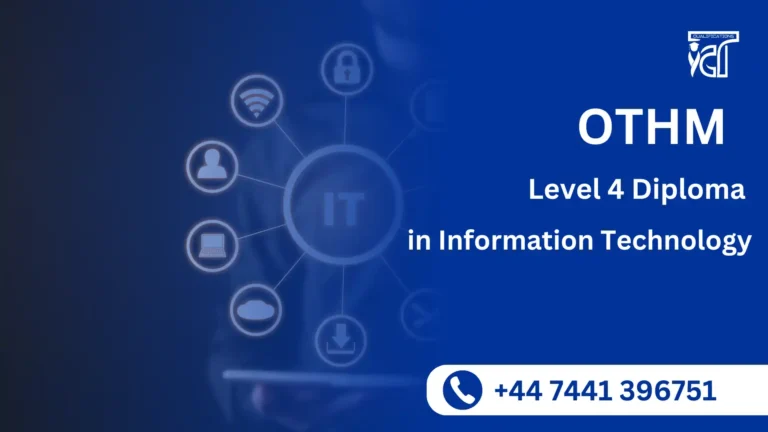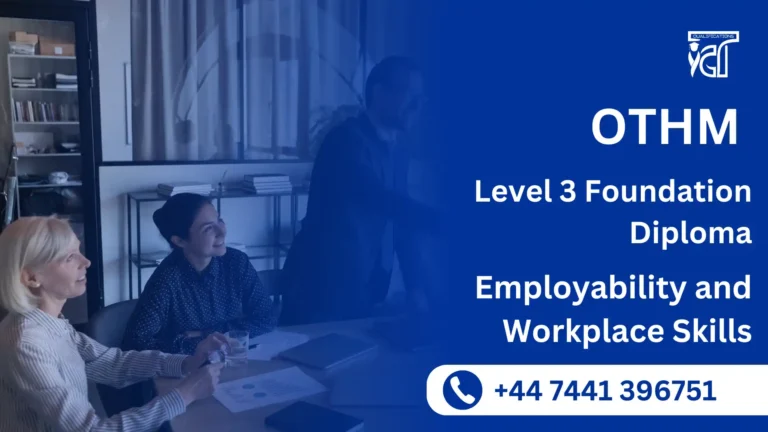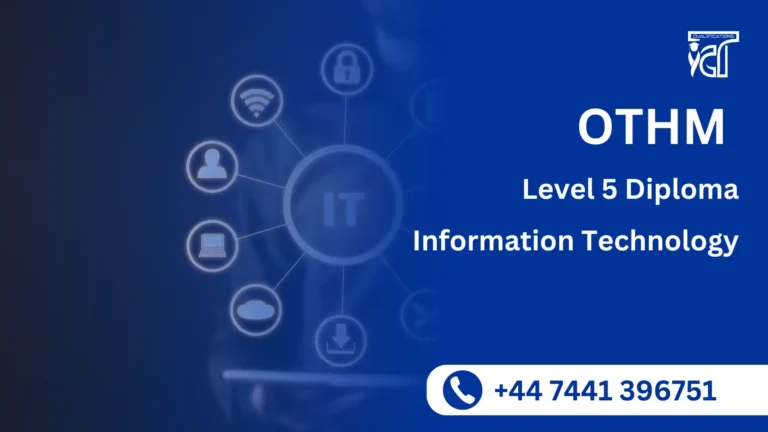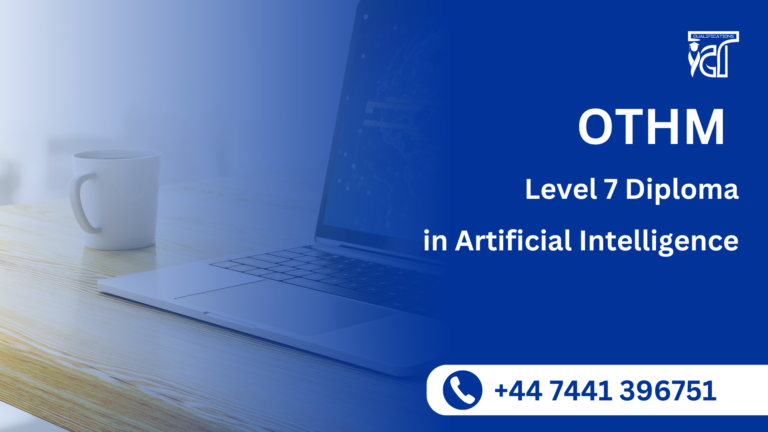The OTHM Level 6 Certificate in Python is designed to equip learners with a deep understanding of Python programming and its practical applications. This Ofqual-regulated qualification provides an advanced, assignment-based learning pathway for those looking to enhance their coding skills and advance their careers in software development, data analysis, and automation.
The OTHM Level 6 Certificate in Python is an advanced qualification aimed at individuals with some prior programming knowledge who wish to deepen their expertise in Python. Recognized by Ofqual (the Office of Qualifications and Examinations Regulation), this qualification adheres to the highest educational standards, ensuring it meets the national qualifications framework. It is an ideal choice for professionals who want to enhance their Python programming skills to meet the demands of modern business and technology sectors.
The qualification is entirely assignment-based, providing flexibility in how learners demonstrate their skills. This assessment method allows for practical, hands-on learning, encouraging learners to apply their knowledge to real-world problems.
The OTHM Level 6 Certificate in Python offers a comprehensive and practical pathway for professionals looking to enhance their Python programming skills. With its Ofqual-regulated status, assignment-based assessments, and globally recognized content, this qualification is an excellent choice for anyone seeking to advance their career in the ever-growing fields of software development, data science, and automation.
OTHM Level 6 Certificate in Python
The OTHM Level 6 Certificate in Python qualification comprises 4 mandatory units, totaling 32 credits. The course requires 320 hours of Total Qualification Time (TQT), with a recommended minimum of 160 Guided Learning Hours (GLH).
| Sr# | Unit Title | Credits | GLH |
|---|---|---|---|
| 1 | Advanced Python Programming | 8 | 40 |
| 2 | Data Processing with Python | 8 | 40 |
| 3 | Connecting and Collaborating with Python | 8 | 40 |
| 4 | Building Python Applications | 8 | 40 |
GLH (Guided Learning Hours) and TQT (Total Qualification Time) are terms commonly used in vocational qualifications to help define the amount of time a learner is expected to spend on heir studies.
1. GLH (Guided Learning Hours)
GLH refers to the number of hours a learner spends being directly taught, supervised, or supported during their course. This includes the time spent in activities such as:
- Classroom instruction
- Practical workshops
- One-on-one tutoring or mentoring sessions
- Online learning sessions with tutor support
In other words, GLH represents the time that learners are actively engaged with their instructors or learning activities.
2. TQT (Total Qualification Time)
TQT represents the total amount of time a learner is expected to invest in completing a qualification, including:
- GLH (Guided Learning Hours): Time spent on direct learning, as explained above.
- Self-Directed Learning: This includes time spent on independent study, research, assignment completion, preparation for exams, and any other work the learner does outside of direct teaching hours.
TQT is a broader measure that includes all the time required to achieve the qualification. It helps learners and employers understand the overall commitment required for the qualification.
Key Differences Between GLH and TQT:
- GLH focuses on direct learning with guidance or supervision.
- TQT includes GLH as well as independent study time and other learning-related activities.
Example:
If a qualification has a TQT of 600 hours and a GLH of 250 hours, it means the learner should spend 250 hours in direct learning (classroom, online, or tutor-led sessions) and 350 hours on independent study or research.
Learning Outcomes of OTHM Level 6 Certificate in Python
Advanced Python Programming
- Understand the purpose of decorators in Python
- Understand typing and its uses in Python.
- Be able to use functional programming techniques in Python
- Be able to write computationally efficient programs in Python.
Data Processing with Python
- Be able to load and manipulate data in Python.
- Understand how popular Python machine learning libraries are used for training and inference.
- Be able to visualise a range of data in Python.
Connecting and Collaborating with Python
- Be able to use Python to interface with web applications.
- Be able to use Git for source code control and collaboration.
- Understand how to write code that is accessible to others.
Building Python Applications
- Be able to build web applications using Python.
- Be able to build graphical user interfaces for Python applications.
- Understand advanced techniques for comprehensively testing Python software
The Course Benefits of the OTHM Level 6 Certificate in Python are as :
- Ofqual Regulated: The OTHM Level 6 Certificate in Python is Ofqual-regulated, ensuring it meets rigorous standards of quality and is recognized both in the UK and internationally. This accreditation provides credibility to the qualification and enhances its value in the job market.
- Practical, Assignment-Based Learning: The course is entirely assignment-based, allowing learners to demonstrate their understanding through practical applications. This hands-on approach ensures a deeper comprehension of Python and its real-world applications, preparing learners for immediate application in their professional careers.
- Comprehensive Coverage of Python: The qualification covers advanced Python programming concepts, including object-oriented programming (OOP), data structures, algorithms, and popular libraries like NumPy and Pandas. This comprehensive curriculum helps learners build a strong foundation and acquire expertise in Python.
- In-Demand Programming Skills: Python is one of the most in-demand programming languages across industries such as technology, finance, healthcare, and data science. Completing this qualification equips learners with the skills necessary to pursue career opportunities in these fields.
- Career Advancement Opportunities: With Python being a key skill for software development, data analysis, machine learning, and automation, this course opens up various career paths. It can help learners advance in their current roles or transition to new opportunities in the tech industry.
- Global Recognition: As an internationally recognized qualification, the OTHM Level 6 Certificate in Python provides access to job markets worldwide. Whether you’re looking to enhance your career domestically or explore international opportunities, this qualification can significantly improve your employability.
- Flexible Learning Approach: The assignment-based structure allows learners to study at their own pace, making it ideal for working professionals. The flexibility of the course allows students to balance their studies with their personal and professional commitments.
- Strong Foundation for Further Education: For those interested in continuing their academic journey, the OTHM Level 6 Certificate in Python serves as a strong foundation for further study. Learners can progress to more advanced qualifications or higher education, such as a Master’s degree in Computer Science or Data Science.
- Problem-Solving and Critical Thinking: The course emphasizes solving real-world problems through Python programming, promoting critical thinking and algorithmic reasoning. This enhances learners’ ability to approach complex challenges with effective and efficient coding solutions.
- Supportive Learning Environment: Learners benefit from continuous support and guidance from experienced tutors, ensuring they receive the feedback needed to refine their skills and progress throughout the course. This structured support fosters a positive and engaging learning experience.
Overall, the OTHM Level 6 Certificate in Python offers an excellent opportunity for professionals to enhance their programming expertise, advance their careers, and gain in-depth knowledge of Python that can be applied to a range of industries.
The OTHM Level 6 Certificate in Python is designed for individuals who have a basic understanding of programming and are looking to deepen their knowledge of Python for professional development. The ideal learner for this course typically:
- Has a Background in Programming: The ideal learner should already have some familiarity with programming concepts. While prior Python experience is not mandatory, a foundational understanding of basic programming languages and logic is essential to benefit fully from this advanced course.
- Professionals Seeking to Upskill: This course is perfect for professionals in fields such as software development, data science, IT, or automation who want to enhance their Python programming skills. It is ideal for those who wish to leverage Python for real-world applications in their current roles or career aspirations.
- Aspiring Data Scientists or Software Developers: Individuals aiming to build a career in data science, machine learning, or software development will find this course particularly beneficial. Python is a dominant language in these fields, and proficiency can significantly improve job prospects and career growth.
- Problem-Solvers and Critical Thinkers: The course is ideal for those who enjoy solving complex problems and have a passion for programming. If you have a natural curiosity for how things work and are eager to apply Python to create practical solutions, this qualification is well-suited to you.
- Ambitious Individuals Looking for Career Growth: The ideal learner is someone who seeks to advance their career by gaining advanced programming skills. Whether you’re aiming for a promotion in your current role or planning to shift to a new career in tech, this qualification can help you achieve your goals.
- Self-Motivated and Independent Learners: As the course is assignment-based, the ideal learner is someone who is disciplined, self-motivated, and capable of working independently. Learners should be comfortable with a flexible study schedule, as the assignments require focused attention and application of knowledge.
- Those Interested in Further Education: For individuals who wish to further their academic qualifications, the OTHM Level 6 Certificate in Python serves as a strong foundation for continuing education. Those planning to pursue higher-level studies in computer science, data science, or related fields will benefit from this qualification.
- Tech Enthusiasts: If you have a passion for technology and programming and are eager to deepen your understanding of Python, this course will allow you to build advanced skills and open doors to a wide range of exciting career opportunities in tech.
Entry Requirements
Register Now
Qualification Process
Qualification Process OTHM Level 6 Certificate in Python
- Self-Assessment:
Begin by evaluating your eligibility to ensure you meet the qualification requirements, including work experience, knowledge, and language proficiency. - Registration:
Complete your registration by submitting the required documents, including a scanned copy of a valid ID, and paying the registration fee. - Induction:
An assessor will conduct an induction to confirm your eligibility for the course and explain the evidence requirements. If you do not meet the criteria, your registration will be canceled, and the fee will be refunded. - Assignments & Evidence Submission:
Provide all assignments and the necessary evidence based on the assessment criteria outlined in the course. If you are unsure of the required evidence, consult with the assessor for guidance on the type and nature of evidence needed. - Feedback and Revision:
The assessor will review your submitted evidence and provide feedback. Evidence that meets the criteria will be marked as “Criteria Met,” while any gaps will be identified. You will be asked to revise and resubmit if needed. - Competence Evidence:
Submit final evidence demonstrating that all learning outcomes have been met. This evidence will be marked as “Criteria Met” by the assessor once it is satisfactory. - Internal Quality Assurance (IQA):
The Internal Quality Assurance Verifier (IQA) will review your evidence to ensure consistency, quality, and compliance with standards. - External Verification:
The IQA will submit your portfolio to OTHM External Quality Assurance Versifier (EQA) for final confirmation. The EQA may contact you directly to verify the authenticity of your evidence. - Certification:
Upon successful completion of all checks, OTHM will issue your official certificate, confirming that you have attained the OTHM Level 6 Certificate in Python







